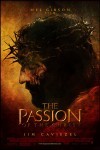Review of “The Passion of the Christ”
 Mel Gibson has gained amazing shoals of free publicity for this film. The viewers either love it or hate it. I come in the second category. There is so much unbearable violence – up to three-quarters of the film – that it is far from a family movie to which you can take your children and expect them to sleep properly that night; it cannot really be recommended for adults either because the unremitting, unrelenting resort to graphic, bloody violence obscures any positive message.
Mel Gibson has gained amazing shoals of free publicity for this film. The viewers either love it or hate it. I come in the second category. There is so much unbearable violence – up to three-quarters of the film – that it is far from a family movie to which you can take your children and expect them to sleep properly that night; it cannot really be recommended for adults either because the unremitting, unrelenting resort to graphic, bloody violence obscures any positive message.
It is hard to justify the claims of some churchmen that it tells things as they were. Scholars have long since recognised the difficulties in regarding the gospels as objective history. The gospel stories are not eye-witness acounts but suffer from a steadily growing after-the-event tendency to rewrite the story to reflect later prejudices. An example is the attempt to remove blame from the Romans and cast it onto the Jewish leaders. One result is that Pontius Pilate changes from a harsh, cruel ruler to a weak, rather benign overseer – in “The Passion”, one of the nicest characters in the story. Another result is that “the Jews” become the enemies of Jesus, when both Jesus and his supporters were Jews.
The role of the high priest is gravely doubted by scholars, who are not at all certain he had the power to condemn Jesus or anyone else. The gospel accounts of Jesus’ arrest and trial suffer from internal contradictions, but even if an agreed version were possible they still offend against the requirements of Jewish criminal law (night-time trials, for example, were not allowed) and no self-respecting Jewish court could have been so ignorant as to infringe the law on every count. If blasphemy were the charge against Jesus, there is no blasphemy (i.e. cursing the Almighty) in Jesus’ words and claims, however much the Jewish people might have criticised them. Jews might have disliked suggestions that Jesus was Messiah or king or both, but this is hardly a capital crime. None of this bothers Mel Gibson, whose idiosyncratic version of events prefers sensationalism to scholarship. It also runs counter to the Vatican instructions as to how to present the story.
Some critics fear that Gibson will create antisemitism. I think it is more likely to foster sadism. Those who do not switch off or walk out may possibly come away with a religious message, but which one? The film offers very little positive spirituality. True, some argue that it shows the redemptive power of suffering. But it overdoes the suffering and offers very little in the way of redemption. Even if the redemptive suffering argument had some validity, would it not be logical to extol the perpetrators as Divine instruments and not to blame them?
There are countless questions of detail which can be asked about “The Passion”. Why does Gibson think that all the Jews spoke Aramaic and the Romans spoke Latin? (Why indeed the particular Aramaic and Latin that figure in the film?) What about neo-Hebrew? What about Greek? How can anyone claim that “the Pharisees hate this man (Jesus)”? Were not the Pharisees the sect with which Jesus would have been the most sympathetic? A leading Christian said to me yesterday that the film has made people talk about Christ. I regret to say that it is not so much Christ they are talking about but Gibson. Others think the film is art. I suppose art can be harsh but here it is unbearable.
Fortunately the film is not the official view or voice of the Catholic Church or any other Christian group, and it will not destroy ail the sincere efforts for interfaith harmony between Christians and Jews – but it may make them a little harder.
…………………………………………………………………………………………………………………
 NEW TESTAMENT PEOPLE: A RABBI’S NOTES
NEW TESTAMENT PEOPLE: A RABBI’S NOTES
Rabbi Dr Raymond Apple’s book discusses some 98 themes in the New Testament and Christianity and shows how Jesus and the early Christians can only be understood against a Jewish background. Rabbi Apple never resiles from his own faith and commitment, but sees the book as a contribution to dialogue.
The softcover and ebook editions are available from Amazon, AuthorHouse, The Book Depository (free worldwide shipping), and elsewhere online.



